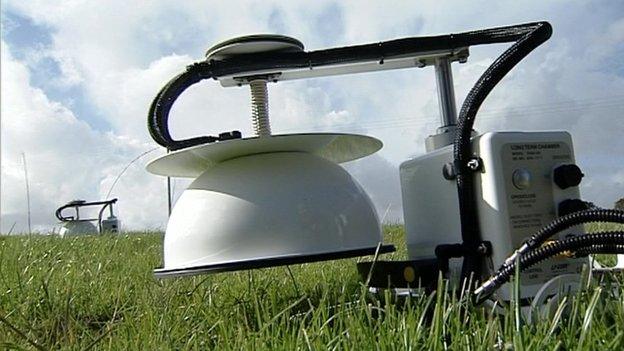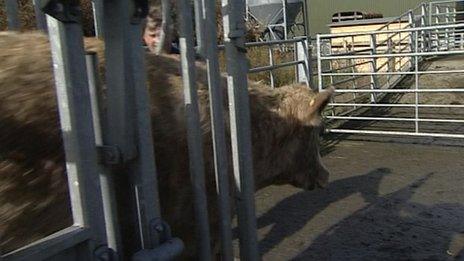Rothamsted research farm seeks answers to food demand
- Published

Mushroom-like revolving chambers measure greenhouse gases from the soil on the "farming platform"
At first glance Rothamsted Research near Okehampton in Devon looks like a normal farm.
Sheep graze peacefully in the fields as tractors rattle around.
But look a little closer and what is happening over 75 hectares is more like a giant laboratory than a farm.
This is an agricultural research centre which has been funded by the government to find ways of meeting the growing global demand for food.
If current patterns continue, experts predict 60% more food needs to be produced globally by 2050.
That seems very remote from the gentle rolling fields of Devon, but it is here they are searching for answers.
The project is called the "farming platform".
Scientists are testing three methods of grassland farming, varying levels of fertiliser and testing new crop varieties, none of which have been genetically modified.
Cows chipped
The cows and sheep are individually chipped and weighed every three weeks to measure their development.
Satellite imagery is also being used to look at the growth of grass, nitrogen uptake and soil conditions.
Dr Phil Murray who is leading the project said: "We have to feed more people from less land because of the increase in world population.
"The hope is that the systems we develop here could be taken up and utilised by grassland farmers throughout the UK and even into Europe."
The environmental impact of scientific advancement is carefully controlled here, right down to tiniest drop of water.
My first impression was that I was standing next to a field with sheep in it, but Bruce Griffith the technical manager, showed me a flume where all the rainfall is channelled into.
Inside a nearby green hut is a mind boggling array of equipment where all the data is analysed every 15 minutes.

Cows are individually chipped and weighed every three weeks to measure growth
There are various probes registering everything from flow rate, to temperature, to conductivity, to levels of ammonium.
The results are then transmitted back to the laboratory, with the aim of preventing potential sources of pollution.
The research has attracted experts from around the world.
Atmospheric scientist Laura Cardenas from Venezuela took me to see a cluster of what looked like futuristic white mushrooms.
The contraptions were set up on the grass with robotic arms that swung round.
"These are automated chambers used to measure greenhouse gases emitted from the soil," she explained.
Greenhouse gas is an unwanted side effect of farming and I asked her how realistic it was to be able to grow more food and at the same time cut greenhouse emissions.
"I think we can do it," she said. "One way is by reducing natural fertiliser to an optimum and using crops that are nitrogen efficient."
The farming platform has government funding for five years, but the scientists here hope it could run for 20.
Students travel from overseas to examine the different systems they are testing.
Experts predict the world population will reach 10 billion by the end of the century, putting pressure on food resources.
It is hoped the research centre tucked away in the Devon countryside may provide at least some of the answers as to how to feed everyone.
- Published24 February 2011
- Published2 August 2012
- Published24 May 2011